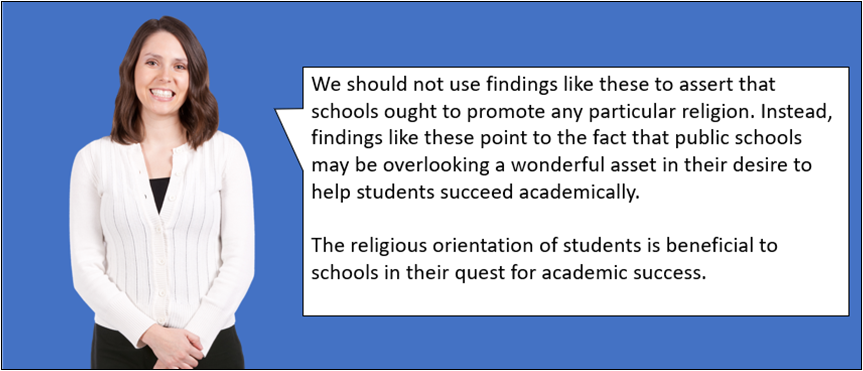
The RESPECT PROJECT focuses on improving student performance by helping teachers lawfully and appropriately support students of all faiths.
Researcher Ilana Horwitz of Stanford University’s Graduate School of Education found that “being religious helps adolescents at the middle and high school level because they have learned the very habits that public schools are structured to reward: conscientiousness and cooperation.”Religious students are helped because the faith community and the school community both pour into students lives the characteristics that help social, emotional, and learning development. For example, both institutions want students to respect authority, be conscientious, cooperative, and kind. Both want students to have a sense of purpose in life. It is a benefit to students when they have others outside the school community helping them develop these traits.It is not the place of public schools to promote religious adherence. However, they can affirm its value for the many students who already attend religious services and for whom their religious faith is already an important part of their identity.INFORM YOUR STAFF
A Review of the Federal Guidance on Religious Expression in Public Schools
Similar to HR or PD training, the RESPECT PROJECT’s 30-minute online module for staff does the following:
Quotes key elements of the U.S. Department of Education’s Guidance on Constitutionally Protected Prayer and Religious Expression in Public Elementary and Secondary Schools.Shows the research on the value of students’ religious upbringing as a social, emotional, and learning asset.Provides links to classroom materials and videos that teachers can use to create a faith-welcoming environment for all students.
Understanding the Opportunities and the Limitations
After reviewing the research showing that students’ religious upbringing is a social, emotional, and learning asset, staff are reminded that...
NOW MORE THAN EVER, WE NEED THIS — “I am excited to encourage other superintendents to implement the RESPECT PROJECT. Now, more than ever, we need this professional development to give us clarity when the waters we are navigating are challenging. We implemented it this year. All the feedback we received from students and faculty was extremely positive. It supports our kids who are dealing with trauma and it dissipates behavior problems. It encourages a sense of well-being. Our goal was to inform them not only on the legal information but to help them emotionally feel like they can be who they are.” — Superintendent Geri Gilstrap





